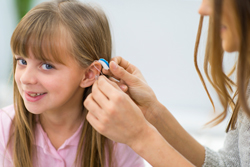Separating Fact from Fiction about Needs and Benefits Related to Hearing Aids

What is interesting, and at times fascinating, about the latter group is the fact that their decision to decline, opt out, or not participate is based on perceptions, prejudices, or third-party attitudes. They do not actually have any personal experience upon which to base an objective opinion; it all tends to be founded on supposition/subjective evidence.
This can frequently be the case with respect to purchasing and/or wearing hearing aids for the first time. There is a tendency for individuals to balk at the notion, or the value, of hearing aids due to pre-conceived biases or misconceptions; this is often fueled by so-called myths that they have perhaps read or heard from family members and/or friends.
Therefore, the intent of this discussion is to debunk many of the common myths about hearing aids in order to help educate individuals, and their families, in situations where these devices are being recommended for the first time. Note that, although there are certainly many myths and misunderstandings about hearing loss, the emphasis here will be limited to those most common to the devices themselves.
- Myth: Hearing aids are only for the elderly or people with severe hearing loss
- A matter of stereotyping – hearing loss is not restricted to specific situations
- Hearing aids can help with varying levels of impairment across all age groups
- Myth: Hearing aids are big, bulky, and unattractive, and readily visible to others
- A question of vanity in most cases and a lack of current knowledge in others
- There are types/styles/sizes of hearing aids to meet most needs/preferences
- Myth: Hearing aids are not required if people still have good hearing in one ear
- In reality, there is a 90% chance that there is some hearing loss in both ears
- Hearing aids improve clarity/understanding and provide natural sound quality
- Myth: Hearing aids make everything sound too loud and they whistle/squeal too
- This was true when hearing aids were analog devices that amplified all sounds
- Modern digital devices reliably filter out background noises, eliminate whistling
- Myth: Hearing aids are cheaper if they are bought online or through mail-order
- This may be true in the immediate term but not necessarily a wise investment
- Hearing loss is patient-specific and requires individualized assessment/support
- Hence hearing aids should be manufactured to meet a patient’s precise needs
The importance of debunking the latter myth should not be underestimated. Although it may be easier, faster, and less expensive to order hearing devices online, it is likely that they will be more generic in nature, designed to provide a basic amount of help to a wide range of patients, in much the same way that drug store magnifiers/reading glasses can help people read the fine print on a package or an application form.
There is a reason why prescription glasses are made for a specific individual i.e. to assist with their established vision needs. For the same reason, hearing aids must be designed relative to the documented degree of hearing loss for the individual patient, and this can only be ascertained and addressed by trained professionals, like the hearing specialists from Bravo Hearing Centre in Toronto.
There Are Many Types of Hearing Aids Available to Best Help Meet Your Needs

The hearing aid specialists at Bravo Hearing Centre in Toronto are fully knowledgeable in all types of hearing aids available to patients. And, based on the results of hearing tests and consultations on each patient’s lifestyle needs and personal preferences, the Bravo Hearing Centre specialists will be able confidently recommend which brand, model, and style of hearing aids from the following manufacturers would be the most appropriate fit:
The Bravo Hearing Centre also offers a full range of hearing aid accessories and hearing-related services such as professional counseling, aural rehabilitation, and on-site hearing aid repairs.
If you have questions or concerns about either purchasing or wearing hearing aids, call the hearing aid specialists at Bravo Hearing Centre in Toronto today at 416-207-9711 to book a complimentary hearing test and/or consultation at your earliest convenience.


